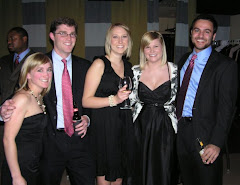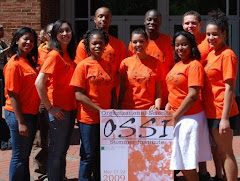Thursday, January 28, 2010
Statistics at Work: An Interview with Dr. Scott Mondore
by Marisa Adelman When was the last time you toiled over a complex statistical analysis? Wanted to bang your head against the computer when your factor analysis failed to converge? Nearly cried when the data did not support your theoretical model? Frustrating as such statistical dilemmas may be, particularly to students early in their graduate career, it is comforting to know that the time and effort we spend staring at the computer is not in vain.
When was the last time you toiled over a complex statistical analysis? Wanted to bang your head against the computer when your factor analysis failed to converge? Nearly cried when the data did not support your theoretical model? Frustrating as such statistical dilemmas may be, particularly to students early in their graduate career, it is comforting to know that the time and effort we spend staring at the computer is not in vain.
In addition to earning us a place in the scholarly ranks and helping us to get published in prominent journals, knowledge of complex statistical analyses and the ability to apply such knowledge to business problems can also earn us a spot in the hearts and minds of business leaders. As discussed by Dr. Scott Mondore, managing partner of Strategic Management Decisions (SMD), our statistical abilities can become a key differentiator in the competitive organizational consulting marketplace.
Dr. Mondore joined us on Tuesday, Oct. 27 to discuss the ways in which the statistical analyses we learn in the classroom can be translated into meaningful results and action items for today’s business leaders. The consulting solutions offered by SMD, the company that Dr. Mondore co-founded in January 2009, are grounded in statistical analyses designed to identify human capital drivers of key business outcomes. Specifically, Dr. Mondore and his business partner, Dr. Shane Douthitt, use structural equation modeling to identify relationships between employee data (e.g., performance ratings, training effectiveness, absenteeism, turnover) and the business outcomes that matter most to their clients (e.g., retention, reduced theft).
Based on the information gained through such analyses, Dr. Mondore and Dr. Douhitt are able to help organizations better prioritize their HR initiatives and invest in areas that will yield the greatest impact. I had the pleasure of interviewing Dr. Mondore following his presentation to dig a little deeper into his experiences as an I/O psychologist and as a new business owner.
M.A.: How did you first become interested in I/O psychology?
S.M.: My goal when I first started my undergraduate degree was to get my MBA because I knew I was going to start my own business at some point. At the same time, I was interested in psychology as a field. A good friend of mine introduced me to someone who was in the I/O program. I didn’t even know the field existed and probably speaks volumes about my early lack of focus on studying. I realized that I could get the best of both worlds—business and psychology.
M.A.: What challenges have you encountered in starting Strategic Management Decisions (SMD)?
S.M.: The first big challenge is marketing….constantly. We (Shane Douthitt and I) started SMD in January of 2009, so you have to keep in mind that to all of our potential customers—we didn’t exist the month before. So getting your name out there through as many channels as possible is critical. The marketing can’t stop just because you land a big project—you cannot let your sales pipeline dry up or you will be very bored and poor when that big project is finished. The second challenge is just starting the business. They don’t teach you all of things that are involved in starting a business in graduate school—picking a company name, picking a legal status (LLC, S-corp, C-corp), creating a logo, buying necessary materials etc. You have to do all of this quickly and with little formal training.
Especially early on in the process, you will see fluctuations in your take-home pay. An ability to adapt to change and a tolerance for ambiguity are critical to making it through the early stages of a new business. Having said all of this, I wish I would have started SMD a few years ago. It is a great feeling to be your own boss and take complete responsibility for your own successes and occasional failures. In spite of the challenges, it is a lot of fun and worth the effort.
M.A.: What do you perceive to be the key challenges facing business leaders today?
S.M.: Coming out of this economy, leaders are going to be very careful about hiring—they are going to be very tight with money and not looking to add back all of the staff that they laid off during the recession. The challenge will be trying to keep productivity levels high (i.e. keep staffing levels low) and not work high-performers to death so that they leave the organization. Turnover, in general, will likely spike as the economy turns, especially in companies that were ‘abusive’ to employees during the downturn.
Leaders also have the challenge of improving their hiring processes—with so many people looking for work, they can be more selective, but they need to so without discriminating. People who haven’t worked in a while and don’t have a lot of interviews lined up tend to be a bit more litigious than they normally might be. Merely conducting unstructured interviews will need to be done away with. Business leaders will continue to demand value from all functions—especially HR. Traditional HR processes are not difficult to outsource, so HR leaders need to step up and be better business partners and use measurement to show their value to the organization. If not, their jobs will be in jeopardy or at least their status within the organization will suffer. The silver lining is that I/O psychologists can help organizations with all of these challenges.
M.A.: So how can I/O Psychologists/Organizational Scientists best help business leaders to address their most pressing challenges?
S.M.: Organizational scientists can attack the challenges mentioned above very easily. We know how to build effective and legal selection systems, we know how to create high-potential development programs and career pathing strategies, we understand how to use statistical analysis to connect people data to business outcomes. These three skills are just a few of the things that we can do to tackle these challenges—amongst many other challenges that organizations face every day.
M.A.: Finally, what advice do you have for Ph.D. students in Org Science?
S.M.: The best advice I can give is first to take business classes with your electives, if you can, to round out your graduate degree. If you really want to be a great business partner, it will help to understand how businesses make money and how to read financial reports. That isn’t enough, though. You need to then be able to apply what you do so that you can have (and show) a measurable impact on business outcomes that actually matter.
Second, take the stats classes and try to get everything that you can out of them—your analytical abilities will be what separate you from the pack in your first job. You can learn a lot about HR processes via experience—but you can’t do this with statistical analytics. Take the classes, study the material and you will thank me soon. Finally, read all of the articles on the syllabus, for every class, no exceptions. The best students and most successful I/O psychologists (i.e. make the most money/got tenure the quickest) that went to my program at the University of Georgia were always 100% prepared for every class, read all the material and added the most to class discussions. Conscientiousness and the pure ability to execute/get things done will be the best trait you can bring to the table in whatever job you take.
To learn more about Dr. Mondore or the unique services offered by SMD, please visit http://www.smdhr.com/. You can also check out his book entitled, Investing in What Matters: Linking Employees to Business Outcomes.
Note: Dr. Mondore is currently teaching Micro Organizational Science II as an adjunct faculty member at UNC Charlotte.












No comments:
Post a Comment